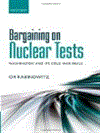|
|
|
Sort Order |
|
|
|
Items / Page
|
|
|
|
|
|
|
| Srl | Item |
| 1 |
ID:
131312


|
|
|
|
|
| Publication |
Oxford, Oxford University Press, 2014.
|
| Description |
xiv, 230p.Hbk
|
| Standard Number |
9780198702931
|
|
|
|
|
|
|
|
|
|
|
|
Copies: C:1/I:0,R:0,Q:0
Circulation
| Accession# | Call# | Current Location | Status | Policy | Location |
| 057786 | 355.825119/RAB 057786 | Main | On Shelf | General | |
|
|
|
|
| 2 |
ID:
177993


|
|
|
|
|
| Summary/Abstract |
What should a powerful patron do when a weaker protégé plans to launch a counter-proliferation strike against the nuclear facilities of a target country? This paper identifies three possible strategies available to the patron when handling a ‘trigger happy’ protégé. These strategies range from lending ‘tacit support’ to the protégé’ on the one end, to ‘intervention by exposure’, on the other end, where the raid is effectively sabotaged. Occupying the middle ground is a strategy termed ‘status quo adherence’, in which the patron attempts to warn the protégé against launching the raid, while simultaneously bidding to mitigate the protégé’s concerns by other diplomatic measures. By accessing previously untapped documents from several archives, the study uses the Carter administration’s approach to Israel’s growing agitation with the Iraqi nuclear programme to explore the strategy of ‘status quo adherence’ and its lessons.
|
|
|
|
|
|
|
|
|
|
|
|
|
|
|
|
| 3 |
ID:
154816


|
|
|
|
|
| Summary/Abstract |
The years following the signature of the Nuclear Non-Proliferation Treaty (NPT) of 1968 have generally been seen as a period of neglect in US non-proliferation policy. While joining recent scholarship questioning this, the article also shows that the policies that emerged from the Nixon–Ford years were the product of a broad range of factors that constrained both the United States’ ability and willingness to build an effective non-proliferation regime. These included the Nixon administration’s initial skepticism regarding the NPT, as well as the global dispersion of power away from the US, combined with the continued importance of anti-Soviet containment.
|
|
|
|
|
|
|
|
|
|
|
|
|
|
|
|
| 4 |
ID:
158011


|
|
|
|
|
| Summary/Abstract |
Based on newly declassified archival documents, the aim of this study is to contribute to an improved understanding of the evolution of the non-proliferation regime through an examination of US and French nuclear cooperation agreements in the latter half of the 1970s. The four pledges of nuclear assistance examined – US assistance to Egypt and Israel, and French assistance to Pakistan and South Korea – failed to materialise by the end of the decade. Why did that happen? What caused the four pledges to fail? We find that the 1974 Indian nuclear explosion and the emergence of opposing domestic factions on the nuclear front in the supplier states generated major changes in US and French nuclear export policies, and also contributed to the development of a collaborative partnership between the two competing nuclear exporters, on the other.
|
|
|
|
|
|
|
|
|
|
|
|
|
|
|
|
| 5 |
ID:
140916


|
|
|
|
|
| Summary/Abstract |
How has the United States behaved historically toward friendly states with nuclear weapons ambitions? Recent scholarship has demonstrated the great lengths to which the United States went to prevent Taiwan, South Korea, and West Germany from acquiring nuclear weapons. Yet seemingly on the other side of the ledger are cases such as Israel, South Africa, and Pakistan, where the United States failed to prevent proliferation, and where many have argued that the United States made exceptions to its nonproliferation objectives given conflicting geopolitical goals. A reexamination of the history of U.S. nonproliferation policy toward Israel, South Africa, and Pakistan, based on declassified documents and interviews, finds that these cases are not as exceptional as is commonly understood. In each case, the United States sought to prevent these states from acquiring nuclear weapons, despite geopolitical constraints. Moreover, once U.S. policymakers realized that prior efforts had failed, they continued to pursue nonproliferation objectives, brokering deals to prevent nuclear tests, public declaration of capabilities, weaponization, or transfer of nuclear materials to other states.
|
|
|
|
|
|
|
|
|
|
|
|
|
|
|
|
| 6 |
ID:
170926


|
|
|
|
|
| Summary/Abstract |
Britain and Canada, two major nuclear Cold War actors, refrained from establishing close nuclear ties with Israel from 1958 to 1974, despite Israel’s consistent interest in importing civilian nuclear technology. This was true both before and after the nuclear Non-Proliferation Treaty came into force in 1970, even though the treaty allowed for the export of safeguarded nuclear reactors. In comparison, the other two leading nuclear exporters of the period, France and the United States, were much more involved in the initial stages of the Israeli nuclear programme, exporting research reactors to Israel in the 1950s. How did Britain and Canada view Israel’s military and civilian nuclear programme from 1958 to 1974? How did they form their nuclear export policy towards Israel and what considerations motivated them? This analysis examines these questions using archival material from British and Canadian archives.
|
|
|
|
|
|
|
|
|
|
|
|
|
|
|
|
|
|
|
|
|